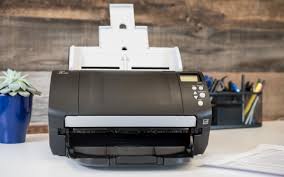
Palace Law, a law firm specializing in workers’ compensation and personal injury, went paperless two years ago to streamline their case and client management system.
“Even if we don’t generate a lot of paper in our office, we have a lot of people who regularly mail things to us,” says Jordan L. Couch, attorney at law for Palace Law.
“A big issue for us is, ‘how do we prepare ourselves, so we can go paperless in an easy way without someone having to stay next to the copy machine all day?’
Goodbye to paper, hello to Clio
“Two years ago, we adopted Clio [a legal management software] for case and client management, and we had the desire to get rid of all our filing cabinets and start scanning things in,” says Ciana Powell, project manager at Palace Law.
Clio’s system enables firms to run a law practice from intake to invoice, with powerful
tools to manage cases, clients, documents, bills, calendars, time tracking, reporting and accounting.
“Using this system, we were able to completely wipe out our entire filing room. We had at least 15 filing cabinets two years ago, and we have no filing cabinets now.”
“Paper documents that come into our office are immediately scanned, and the only way we will work on them is electronically,” Powell says.

“We decided on the Fujitsu fi-7160 scanner, which is compatible with Clio’s Uploader software,” Powell recalls.
Image quality, paper handling and reliability were key factors in choosing the fi-7160.
One of the most helpful things that Clio has done for client law firms is opening their API (application Programming Interface) to allow customers like Palace Law to build tools suited to their specific needs.
“Clio has been extremely helpful, and they have come to our office to meet with us and help us work better,” Couch says.
Creating a new workflow
“There’s a baseline of technology you need [for your law firm], which is your cloud-based practice management, which is Clio. Then, there are new workflows, and hardware like the Fujitsu scanners, which you have to become comfortable with before you do anything.” Couch adds.
While Palace Law is at the top of the learning curve, the transition to paperless is still ongoing.
“We have attorneys who have been practicing for 30 years, paralegals who have been doing it for 15 to 20 years and new attorneys who have been in it for just a couple of years. It is a very diverse group.”
“During the first year, we set aside time to train employees on the new tools and go over the old tools again, so everyone had comfort with the baseline technology we used,” Couch recalls.
“The Clio solution, along with Fujitsu scanners, helped us increase efficiency, open up office space and automate menial tasks. Basically, it was the key to us becoming a paperless, semi-virtual law firm,” says Couch.



